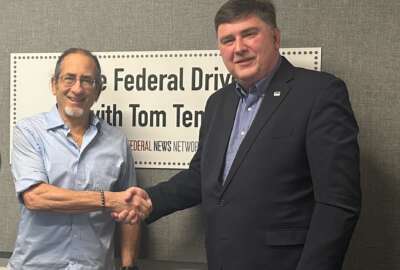Despite increased reporting of sexual assaults, DoD still struggles to tackle issue
It's been 23 years since the Tailhook scandal rocked the Navy, and the Pentagon is still struggling to eliminate sexual assaults from the military. The number of...
wfedstaff | April 17, 2015 6:53 pm
Twenty-three years ago, Paula Coughlin, now a board member of Protect Our Defenders, was a Navy officer and one of the victims and whistleblowers of the Tailhook scandal.
In an interview for Federal News Radio’s special report, Trust Redefined: Reconnecting Government and Its Employees, Coughlin said she believes the military has done very little in the 23 years since Tailhook to prevent sexual assaults in the military from occurring.
“By prevention, I mean actually prosecuting those people who are the perpetrators of these crimes,” she told Federal Drive hosts Tom Temin and Emily Kopp. “When the crimes continue to become exponentially prevalent among our ranks and military members start to connect that what happened to them happened to somebody else happened to somebody else, and the numbers become more and more outrageous, I think it bears out that there really is no progress in fighting this epidemic and there’s no reason why any military member should feel like they could trust their command to take care of this issue.”
Although Tailhook was a huge scandal and some military officials did lose their jobs, Coughlin says she did not see any real changes come out of it.
“Everyone retired with full retirement benefits somewhere along the lines of their career,” she said. “I left with nothing. Most sexual assault victims end up leaving the military very broken and with very limited benefits.”
That pattern has not changed over the 23 years since Tailhook, Coughlin said, because the military has done very little to actually reform it’s approach to sexual assaults.
“The Pentagon counts how many people can finally come forward and file a complaint of sexual assault and the Pentagon writes lots of reports about the environment, the dynamic and the prevalence of crime, but they never really have done any reforms that result in prosecution of those crimes. So, they’re going to keep reporting and they’re going to keep the status quo because it’s easier for them and I also believe that there’s an underpinning, a foundational flaw in the way the military views sexual assault.”
Reports of assaults surge by 50 percent
Coughlin’s perspective is shared by many federal employees.
In an exclusive Federal News Radio survey, only about 12 percent of respondents said the military is doing enough to prevent sexual assaults from occurring within the ranks. More than 58 percent said the military is not doing enough.
“Too often, it still feels like a slap on the wrist,” one respondent said. “That may be a reason why some victims do not come forward. Also toss in the appearance of the old boy network still in place.”
Reports of sexual assaults in the military surged by 50 percent last year, according to a recent Department of Defense report. Secretary Chuck Hagel says these numbers don’t reflect an increase in actual cases of sexual assaults, but instead, are the result of DoD’s aggressive campaign to encourage victims to come forward and report assaults.
“We have to fight the cultural stigmas that discourage reporting and be clear that sexual assault does not occur because a victim is weak, but rather because an offender disregards our values and the law,” Hagel said.
For the fiscal year ending Sept. 30, 2013, 5,061 service members reported being victims of some form of sexual abuse. That’s up from the 3,374 cases reported for fiscal year 2012. Ten percent of the incidents reported in 2013 occurred before the victim entered the military, compared to 4 percent in 2012.
“We believe victims are growing more confident in our system. Because these crimes are underreported, we took steps to increase reporting and that’s what we’re seeing,” Hagel told reporters May 1. “We also had 492 service members — nearly four times more than ever before — come forward to report assaults that had occurred before they joined the military, which meant that we were able to get them the care and support that they need. However, we also believe these crimes are still underreported, so we must keep up the pressure and intensify our efforts to improve victim confidence in our system.”
Disagreements persist over how to solve the crisis
The 2014 Defense Authorization Act, passed by Congress late last year and signed into law by President Barack Obama, sought to address the military’s sexual assault crisis in a number of ways. The law bars military commanders from overturning jury convictions, requires civilian review boards to review cases where commanders decline to prosecute and limits intrusive questioning of victims.
But some lawmaker have sought more far-reaching remedies.
One reform — Sen. Kirsten Gillibrand’s (D-N.Y.) amendment to the Military Justice Improvement Act — fell short of the votes needed to advance in the Senate. Lawmakers removed language in the bill that would’ve taken the decision-making out of the hands of military commanders to advance serious crimes to court-martial, and given it to seasoned military trial lawyers.
Despite failing to garner enough votes on Capitol Hill, Gillibrand’s proposal was strongly supported by federal employees and managers responding to Federal News Radio’s survey on trust in the government. More than 61 percent of respondents said the prosecution of sexual-assault cases should be taken out of the military chain-of-command, while about 23 percent disagreed.
“The military chain-of-command should be taken out of the equation all together,” one respondent said. “This is one area that should be handled by civilian courts.”
However, DoD leaders, former prosecutors and military veterans opposed Gillibrand’s legislation. They argued that military leaders needed more responsibility, not less, in handling service members’ conduct.
“First and foremost, the person with the tools and the ability to affect cultural change is the commanders,” said Max Maxwell, strategic initiatives officer in the Army Judge Advocate General’s Corps. “We saw it with racial integration. We saw it with gender integration. We saw it with Don’t Ask, Don’t Tell. That cultural change is not going to be done by a band of lawyers. … It is the commander who has the structure, the authority, but also is held accountable to make sure that we are in the right direction in making sure we eradicate within our ranks sexual assault.”
Maxwell sees the increase in the number of reported sexual assaults as an indicator that prosecutions will be on the rise as well.
“The more reporting you get, the more that we’ll have the kind of transparency on the system that those who have perpetuated these crimes can then be brought to justice,” Maxwell told Federal Drive hosts Tom Temin and Emily Kopp. “That includes, for instance, a court martial and bringing criminal sanctions against that individual.”
Maxwell called the report significant because it showed an increased number of people feeling comfortable in coming forward to report a sexual assault. He also sees significance in the increase in number of reported cases that occurred before victims entered the military.
“We are an all-volunteer force,” Maxwell said. “We are a reflection of society. We get our people and they do something that is pretty profound. They raise their right hand and they swear an oath to the Constitution. As a Judge Advocate General’s Corps, we are expected to enable that commander, he or she, to set a climate and a culture that’s going to say ‘This is not acceptable behavior,’ i.e., sexual assault.”
To that end, the Army JAG stood up the Special Victim Counsel and Special Victim Prosecutors programs.
“We also marry up with our criminal investigators and they have a special corps of investigators who know how to investigate these types of crimes,” Maxwell said. “So, there has been an increased signature in our demand, but ultimately … finding a solution set to this and getting a culture that we think is going to be one that everyone can prosper in is everyone’s responsibility, but in particularly, the responsibility of that commander, because that commander’s going to set the tone, he or she, to make sure that this kind of behavior is not accepted. And, therefore, it’s the JAGs who are going to be in that supporting role and help that command make sure that it is a sexual-assault-free environment and one in which people can prosper.”
Despite the setbacks on Capitol Hill and at the Pentagon, Coughlin said bills like Gillibrand’s offer real reforms to how the military justice system prosecutes these types of crime.
“When I see that the field opens equally to men and women to serve their country and the roles that used to be limited to men only are now open across the board, ultimately, I think these armed services are going to understand that the most qualified and professional person is going to serve regardless of gender,” she said. “I also think that that is going to elevate the level of professionalism. It’s going to elevate the level of leadership. When you start seeing women becoming leaders and commanding officer roles, all the way up through the chain of command, I personally think it’s going to really elevate our command readiness.”
MORE FROM THE SPECIAL REPORT, TRUST REDEFINED:
Introduction: Can trust be rebuilt between feds and the government?
Whistleblower hotlines changing the way IGs respond to waste, fraud and abuse
Is hike in whistleblower claims a sign of progress or growing mistrust?
Q&A with Thomas Drake – one of government’s most famous whistleblowers
Agency budget squeeze eroding trust between employees, management
Are you violating the Hatch Act and you don’t even know it?
Copyright © 2025 Federal News Network. All rights reserved. This website is not intended for users located within the European Economic Area.
Michael O’Connell is senior digital editor of Federal News Network optimizing content for the best user experience. Follow @moconnellWFED
Follow @moconnellWFED






